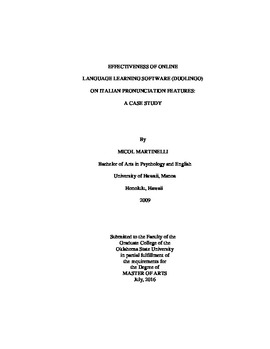| dc.description.abstract | This study aimed to evaluate the effectiveness of online language learning software for the acquisition of pronunciation macro skills (comprehensibility and accentedness) and micro skills (gemination and voice onset time); specifically, this study focused on Duolingo, a data-driven online language learning software created in 2011. Designed as a case study, it followed five participants through four weeks using Duolingo to learn Italian. Data were collected through both quantitative measures, such as Duolingo reports, acoustic analysis in Praat, and native speaker ratings, and qualitative measures, such as interviews, observations, and questionnaires. Findings from the native speaker ratings on comprehensibility and accentedness revealed a statistically significant improvement in one of the participants. Further, findings from the analysis of practice data and the acoustic analysis showed that those participants who practiced more, through the repetition of lessons, were more likely to improve their pronunciation, while those who tended not to repeat lessons, showed very little signs of improvement. However, the results also indicate that language and linguistics training, typology of L2 and consequent languages, and recency of language study also impact levels of improvement.The findings from the perceptions of the participants on the effectiveness of Duolingo for the acquisition of pronunciation skills further corroborate the finding that online language learning software like Duolingo do implement certain pedagogically sound practices, which is certainly a step forward in the development of sound, valid, programs. However, the results of the study also reveal the need to calibrate such practices through modifications to design. The implications of these results relate to both theory and practice, and highlight the facts that with appropriate research, technology can become - and has possibly already begun to be - an engaging and efficient tool for language learning and that the future of online language learning looks bright. | |
